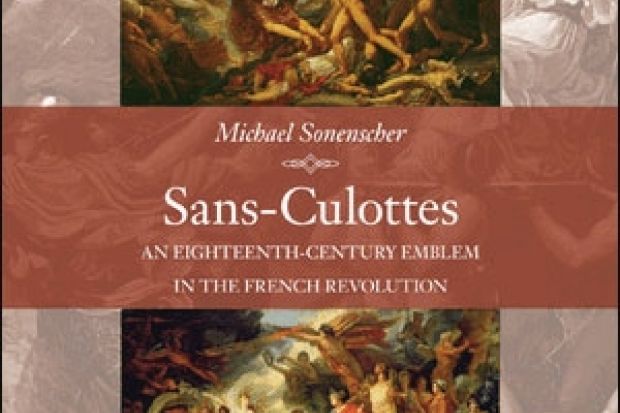The rather bland title of this book obscures its far-ranging ambitions. Michael Sonenscher begins with an early 18th-century salon joke and ends up analysing the relationship between democracy and terror.
Along the way, he explores known territories that have never been linked in this manner before: arguments about fashion and trade; Jean-Jacques Rousseau's writings on music and morality; considerations of property and equality in French thought; and visions of a society in which advancement depends on merit rather than special privilege.
In this and a companion work, Before the Deluge: Public Debt, Inequality and the Intellectual Origins of the French Revolution (2007), Sonenscher aims at nothing less than a "historiographical realignment" integrating politics and economics into a single narrative of the French Revolution.
However, when he says "politics" and "economics", he mostly means texts about those subjects, not political events and economic policies.
Sonenscher's intervention could not be more timely. The debates about the French Revolution have reached a dead end. The Marxist account of a bourgeois revolution against aristocratic and feudal forms of government lost credibility just as Marxism and Marxist-inspired parties and regimes collapsed in Europe in the late 1980s.
To cite just one example, the Marxist account could not explain why bourgeois leaders killed each other instead of installing a bourgeois capitalist order.
The anti-Marxist version of the French Revolution as the origin of totalitarianism then rose triumphant, only to decline itself at about the same time as the break-up of the Soviet order produced its own disappointments.
The version inspired by the work of Francois Furet could not explain how the revolution of 1789 gave birth simultaneously to republicanism, democracy, the Terror and the reaction against the Terror, not to mention the military dictatorship under Napoleon Bonaparte.
It is time to change the terms of the debate, and this book aspires to do just that. Sonenscher rejects any interpretation that depends on 19th-century philosophies of history, such as the works of Karl Marx or Furet's favourite, Alexis de Tocqueville. He seeks instead to find one that fits with 18th-century conceptual usage.
To that end, he takes the reader on a breathtaking ride down the labyrinthine byways of writings about economic, political and moral reform. The effect is dizzying in both a good and bad sense.
Sonenscher has read widely and deeply, and his pages are peppered with brilliant insights into individual writers such as Rousseau. Indeed, the philosopher is more the subject of this book than either the French Revolution or the sans-culottes.
The problem comes in linking the writers Sonenscher considers into a chain of persuasive reasoning.
Too often it is unclear why he chooses to focus on a particular writer, how he moves from one to another or, more generally, how he establishes a causal relationship between the first link in his chain of thought and the last one.
The sans-culottes of the book's title are an obvious example. Most readers would expect the text to be about the sans-culottes either as a social or political grouping (they were the lower-class militants of the radical revolution) or as an icon for an underlying social or political process, such as radicalisation or democratisation.
Since Sonenscher has no entry in his index for the pre-eminent historian of the sans-culottes, Albert Soboul, clearly the book is not focused on them.
Even as an emblem or icon, the sans-culottes do not serve the function readers might expect.
Sonenscher traces the term, which literally means "without breeches", to a 1770s salon witticism about writers without patrons, yet he goes from there not to revolutionary politics but to erudite discussions of civility, politeness and morality.
He finally arrives at 1789 towards the end of the book, and once there he devotes a substantial chunk of his key chapter to just one figure, Antoine-Joseph Gorsas, hardly a household name of revolutionary politics. Gorsas may well have played a role in "turning the word sans-culotte into a synonym for the ordinary people of Paris", but how vital was that contribution to events?
Even though Sonenscher falls short of his goal of reframing French Revolutionary historiography, he succeeds in recasting the discussion of many topics that were central to 18th-century thinkers, especially their indebtedness to Greek and Roman sources.
His learning on these subjects is dazzling, and his positioning of writers along a "Cynic" versus "Ciceronian" axis is telling. Cynics, such as Rousseau, criticised social convention and therefore privilege, inequality and excessive property. Ciceronians, in contrast, prized the civility and decorum produced by the cultivation of the arts and sciences.
Sonenscher knows "how much of the moral and political thought of the period before 1789 was blotted out by the events of the French Revolution", but with his focus on "thought", he cannot tell us what replaced it or why the revolution permanently recast the terms of such debates. For that, the philosophies of history conceived in the French Revolution's wake remain invaluable.
Sans-Culottes: An Eighteenth-Century Emblem in the French Revolution
By Michael Sonenscher
Princeton University Press
508pp, £32.50
ISBN 9780691124988
Published 22 October 2008
Register to continue
Why register?
- Registration is free and only takes a moment
- Once registered, you can read 3 articles a month
- Sign up for our newsletter
Subscribe
Or subscribe for unlimited access to:
- Unlimited access to news, views, insights & reviews
- Digital editions
- Digital access to THE’s university and college rankings analysis
Already registered or a current subscriber? Login
